
Episode 07:
Mini Manila
The Everyday Life of Filipinos in Israel
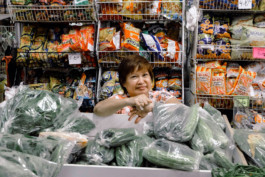
The first floor of the Tahana Merkazit is known as Mini Manila: Filipino food shops and travel agencies are open here on weekdays (from 8 am to 9 pm). On Saturdays, when most workers have their day off, a huge food market with homemade Filipino food is open up until 10.30 pm.

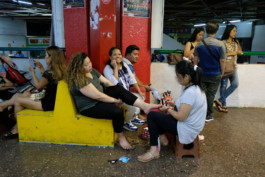
In Mini Manila, you can find rice sweets, a cake called puto, siomai dumplings, siopao steamed buns with pulled pork or beef, pork barbecue with sweet and sour sauce, halo halo — a cold cocktail made of ground frizzed milk and various kinds of jelly, and sometimes even such extreme delicacies as rotten eggs or balute — a developing bird embryo that is boiled and eaten from the shell. Some Filipinos who get married to Israeli citizens start to grow their traditional vegetables in moshavs. So fresh exotic greenery, like bitter gourd ampalaya, okra or kangkong are sold at the market. Whatever a Filipino misses from home can be found at the Tahana Merkazit!



The life of Filipino Tel-Avivians can also seem pretty exotic. They don’t have free time to shop for clothes — so they buy clothes and accessories online from numerous facebook groups. And as it’s too difficult to find time to meet, they just leave products and money for each other in one of the shops near the Tahana Merkazit.
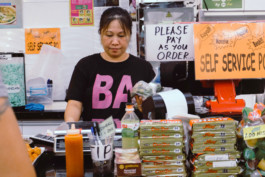
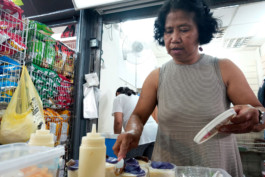
Filipinos rent one-room apartments near the Tahana Merkazit which they share with 10 to 20 other people. It sounds very crowded, but it’s only for one night a week or even less, the rest of the time they live with their clients.
For a foreign caregiver in Israel, relationships and family life aren’t easy. If the authorities learn of a romantic relationship between two foreign workers, it requires one of them to leave Israel. In some cases, even the employers are pressured by the authorities to provide information about caregivers’ relationships.
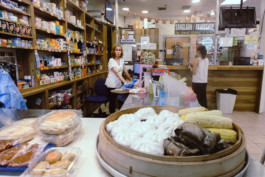
Getting to Israel is a true quest. To receive a work visa most Filipinos pay $7000-8000 for a so-called "placement fee" to an agency. In order to do that, some sell their houses or borrow the money and come here with massive debts. However, it’s still a good deal as one month salary here is 3 to 4 times higher than in The Philippines. A caregiver earns approximately 4000 NIS plus extra payment for no day off, a 100 NIS weekly allowance, and some extra payment if they work holidays and weekends. Some generous employers give them an extra few hundred shekels a month. All in all, it takes the average Filipino worker about two years to pay off their debt.
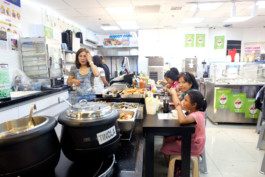
Before coming to Israel, Filipinos undergo a three-week-long training — one week of medical caregiving training, one of cleaning and cooking and lastly one week of basic Hebrew. In total, the training costs around 1000 NIS.







Israeli Law permits foreign workers to remain in Israel for four years and three months. If after this, the employer is still alive and still wants to continue employing the caregiver, he/she can then renew his/her work visa yearly. When the contract is over, the foreign worker is required to leave. It's not permitted for a Filipino to come to Israel for work a second time. Some people stay here illegally. According to some sources there are currently 6,000 Filipinos living in Israel without documentation.
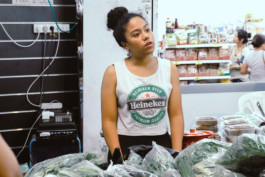
OFW — Overseas Filipino Workers. This abbreviation Filipino immigrants use to describe themselves.
P.S. Liezl Diamante Sieton

“I have degree in Business Management. But right after I graduated I moved to work as a metapelet [Hebrew word for ‘caregiver’] in Tel Aviv. I was 21, it was my first time away from my family, and I was crying every night in the beginning. But step by step I found some friends and now I like it here.
My first safta (grandmother or elderly lady in Hebrew) had a tracheostomy and a hole in her stomach. So taking care of her was very hard. I worked with her for four years and then she passed away. We all prepare ourselves for the day that a person we spend all our time with will die one day. But still we get attached to them. When my first safta died, I think I cried more then her child.
Then 7 years ago, I found my second job which I still have now. The old lady I’m taking care of has a Alzheimer’s and Dementia; she’s helpless and very dependent on me. Her daughter wouldn’t let me go on vacation because the safta is very upset when I’m not near her. I work 24/7, but from time to time I find someone to substitute for me for few hours in the evening when she is sleeping. I haven’t been on vacation in 5 years and my last day off was last year.
Very often the safta is lamenting all day and if I don’t find a way to calm myself down I go crazy. So I just put on my earphones and listen to some music or go downstairs to throw away the garbage and take a deep breath or call a friend to talk a little bit about something different.
Recently I saw at the Tahana Merkazit an announcement attached to a wall. People were looking for a caregiver and they listed some position requirements. In the end it said: 'But not on the phone all the time'. The truth is that sometimes we are too stressed in our work. The old people are getting very ‘nudnik’ sometimes and it’s easy to run out of patience. So calling each other helps us release the stress.
Caregiving is the only job we can get here. Israelis are paying us because we are patient. Most of them don’t have what it takes to take care for their own mom and dad. It’s very hard work both physically and mentally. Back in The Philippines, I have my parents, my two brothers and a sister. My life now is a sacrifice for the family that I support. So I hope to stay here as long as possible.”
Text Asya Chachko
Photo Sasha Zacks
more episodes
© 2017–2024 Made in Tel Aviv with love. Email Us, Follow on Facebook